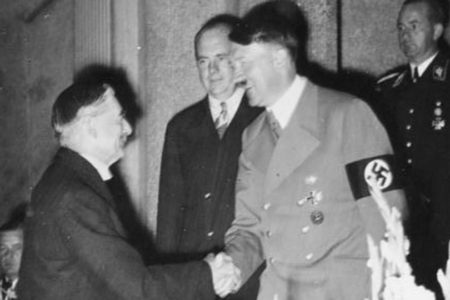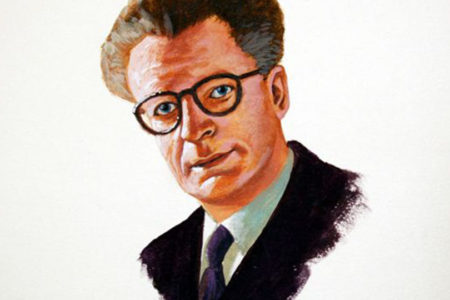The Roots of Nazism
In July 2005 Elliot Stein, 23, of Brooklyn, New York, and his girlfriend received their bill after dining at a restaurant at the New Jersey shore. What Mr. Stein saw shocked him. Scribbled on the bill were the words, Jew Couple.
When he complained, he was told the notation identified his table for the waitress. The same notation appeared on his credit card statement later that month. As of this writing, the New Jersey Attorney General’s Office is investigating.
Four years earlier, Daniel Bernard, France’s ambassador to the United Kingdom, attended a dinner party in London where he referred to the State of Israel as “that _ _ _ _ _ _ little country.”1
Are these incidents merely isolated aberrations? If you run a computer search for the word anti-Semitism, you will see they are not. The world is witnessing an alarming rise in anti-Semitic incidents, including attacks on cem -eteries, synagogues, and businesses. According to a recent survey conducted by the Anti-Defamation League, 12 European countries are strongly anti-Semitic.2 In August Pope Benedict XVI confirmed these findings when he said, “Today, sadly, we are witnessing the rise of new signs of anti-Semitism.”3
The Jewish community worldwide looks with much concern at a climate reminiscent of pre-Holocaust Nazi Germany. Seemingly isolated occurrences then were but a foreshadowing of what was to come: the worst imaginable anti-Semitism—the systematic liquidation of 6 million Jewish people. And the environment that led to that Holocaust is reemerging today.
Martin Luther’s Legacy
Two indisputable facts permeate the Scriptures: (1) God chose the Jewish people as His own and (2) He chose to give them a specific land (Israel) in perpetuity.
Unfortunately, a theology arose that repudiated these facts. It goes like this: Because the Jewish people rejected Jesus as their Messiah, they forfeited those promises. Such thinking dates back to Constantine who, in A.D. 321, declared Christianity the official religion of the Roman Empire. Many believed the Jewish people were like Judas, the disciple who betrayed Jesus. Judas was cursed. Thus, they reasoned, the Jews are cursed; and God is finished with them.
This theology claims God chose another people (the church) and another place: Rome. Until the Great Emancipation of the 18th century, the church even encouraged Gentiles to take action against the “Christ-killers.” For years it taught that Jewish people were demonic God-haters and rebels, guilty of killing the Son of God. These Christians influenced kingdoms to implement laws requiring Jewish people to wear distinctive badges on their clothing, live separated from Gentiles in ghettos and, if necessary, to be expelled to preserve order in society.
Church history overflows with examples of clergy who derided the Jewish people. Ignatius, Justin Martyr, John Chrysostom, and Gregory of Nyssa were but a few. They believed the sin of the Jewish leadership that demanded Jesus’ death passed to all Jewish people for all time.
Of all the truly born-again church leaders who held to such a position, none hurt more than the great reformer, German-born Martin Luther. Although he wrote many wonderful treatises for Christians, he was a vicious anti-Semite. In his book On the Jews and Their Lies, he described the Jewish people as “venomous,” “bitter worms,” and “disgusting vermin”4 and encouraged violence against them:
What shall we Christians do with this rejected and condemned people, the Jews? Set fire to their synagogues or schools and…bury and cover with dirt whatever will not burn, so that no man will ever again see a stone or cinder of them….I advise that their houses also be razed and destroyed…that all their prayer books and Talmudic writings…be taken from them,…that their rabbis be forbidden to teach….I advise that safe-conduct on the highways be abolished completely for Jews…[and] all cash and treasure of silver and gold be taken from them.5
What caused him to write so despicably? He believed, “Next to the devil thou hast no enemy more cruel, more venomous and violent than a true Jew.”6 Martin Luther’s diatribes against the Jewish people were recycled often as justification for anti-Semitism. They are used even today.
The Obsession With Nationalism
When Napoleon led France to victory over Germany in the late 18th century, the French became occupiers for some 25 years. During that time they spread the ideals of enlightenment, which emphasized reason, increased knowledge, liberty, and justice for all citizens.
Jewish people in Germany became beneficiaries of this “enlightened” thought. The Germans, resenting their French occupiers, took umbrage at the benefits going to the Jewish people. Two of them were philosophers, both strong nationalists.
Known as the father of German nationalism, Johann Gottlieb Fichte taught philosophy at the University of Berlin. He saw the Jews as decadent, a threat to the rich heritage and abilities of the German people. He characterized Jewry as “a mighty state [that] stretches across almost all the countries of Europe, hostile in intent and engaged in constant strife with everyone else.”7
Upon Fichte’s death in 1814, the nationalistic mantle fell on none other than Georg Wilhelm Freidrich Hegel. For Hegel, the state (Germany) was everything. It served as the moral purifier. It transcended the importance of any individual. And, said Hegel, every German citizen had a responsibility and duty to serve it.
Now the Jewish people were seen as “others,” aliens to the German state. German nationals demonstrated against them. In 1819 violent anti-Semitic riots broke out, and mobs chanted, “Death and destruction to all the Jews.”8
The divide between Jews and Germans widened. Germans were challenged to follow the volk, a concept embodying the essence of Germany. Greater than merely the people, greater than the land or the culture or tradition, the volk was to embody the distinctive soul of the German people, their sense of belonging, and their shared destiny.
The mentality of the volk, combined with the religious position that God’s Chosen People were cursed as Christ-killers, instilled fear in the Jewish people and had them always looking over their shoulders.
Christian Lassen (1800–1876), professor of ancient civilizations at the University of Bonn, argued that Semitic people are inherently “selfish and exclusive.”9 German philosopher Paul Lagarde (1827–1891) described Jews as disease-producing bacteria:
One would need a heart as hard as crocodile hide not to feel sorry for the poor exploited Germans and…not to hate the Jews and despise those who—out of humanity!—defend these Jews or who are too cowardly to trample this usurious vermin to death. With trichinae and bacilli one does not negotiate, nor are trichinae and bacilli to be educated; they are exterminated as quickly and thoroughly as possible.10
Two major works also fanned the anti-Jewish flames. Foundations of the 19th Century, by H. S. Chamberlain, was often referred to as “the Bible of the racists.”11 Chamberlain mesmerized the masses with his distorted “proof” of Aryan superiority and said Jewish people “feed upon [Germans] and suck out—at every grade of society—their very life blood.”12
In Foundations he wrote that (1) the Jews were aliens and disrupters of civilization, (2) the Aryans were responsible for all the important contributions to civilization, (3) Jesus was not Jewish but Aryan, and (3) physiognomy was a legitimate science capable of predicting character by physical features.
The work spewed anti-Semitic religious jargon, mostly by quoting Martin Luther. Published in 1895, it went through 28 printings “of more than a quarter of a million two-volume sets” by 1942, wrote David A. Rausch in his book A Legacy of Hatred.13 Two people extremely familiar with the work were Kaiser Wilhelm II and, later, Adolf Hitler.
The second major work was The Protocols of the Elders of Zion. (See The Protocols of the Elders of Zion) This sinister villainy claimed there was (and is) a Jewish conspiracy to take over the world. Originally written by Maurice Joly in 1864 to outline Napoleon’s desire for worldwide domination, it was later crafted into the infamous Protocols by substituting the word Jewish for French. It profoundly affected the German people, deceiving many of them into believing a group of Jews was secretly working to take over Germany and the world. In 1927 automotive mogul Henry Ford published excerpts in The Dearborn (Mich.) Independent newspaper.
Such thinking gave rise to anti-Semitic politics in Germany. In 1879 German historian Heinrich von Treitschke published a series of anti-Semitic articles, the last being, “The Jews Are Our Misfortune.”14 His work influenced 250,000 people to sign a petition demanding no Jews be allowed to hold government or teaching posts.15
Local politicians began running on this anti-Jewish platform, declaring they would protect Germany from the Jewish people, who, they claimed, were contaminating society. Petitions circulated to restrict Jewish immigration. In 1890 Hermann Ahlwardt won a seat in the Reichstag (parliament) on the platform that Jews were cholera, bacilli, and beasts of prey.
In response, Jewish people tried to demonstrate their loyalty as Germans. Reform (liberal) Judaism had begun in Germany, partly as a way for Jews to remain Jewish but appear more Gentile. Many Jewish people sought to be less distinctive, to blend in, to lead a more assimilated life and yet maintain their identity.
The Bitterness of Defeat
On June 28, 1919, defeated and humiliated after a terribly costly war, Germany was forced to surrender in Versailles, France. The conditions forced on the country through the Treaty of Versailles made Germany compromise the volk, which it so willingly embraced. The country was made to admit that it alone had been responsible for what later became known as World War I. Its army was cut to 100,000, and it had to return land and pay reparations. The area of Alsace-Lorraine went back to France; and territories Otto Von Bismarck had conquered went to Belgium, Denmark, and Poland. Reparations were set at 132 billion gold marks, “or about $33 billion, a sum they could not possibly pay.”16
One-sixth of the entire German-Jewish population, nearly 100,000 people, had valiantly served their country in the war, 12,000 of them losing their lives. Yet the blame for defeat was placed on the Jews. Accusations circulated that the Jewish soldiers fought not for Germany, but to “dominate the nation.”17
As a result of its defeat, the German government became the Weimar Republic. While some Germans embraced this new republic, others were embittered by the humiliation at Versailles. One soldier who survived the war found the taste of defeat particularly bitter; his name was Adolf Hitler.
Economic Chaos
As a result of the huge reparations, the German economy floundered. Inflation skyrocketed. In 1919 nine German marks equaled one dollar. By 1923 the equivalent was an astounding 4.2 trillion marks.
President Paul von Hindenburg was able to renegotiate reparations with the Allies and address inflation by issuing a new Reich mark. The country began to thrive. Despite the anti-Semitic atmosphere, the Jewish people also prospered. Then came the stock market crash of 1929. It produced unemployment, which produced discouragement, which produced resentment, which all became aimed at the Jewish people.
In many religious, social, political, and scholastic environments, the Jewish people’s very existence became the excuse for all Germany’s troubles. The Germans believed if they could deal with the Jewish “problem,” all their other troubles would disappear.
The country was poised to welcome a leader with volkish pride who would rid it of these insidious creatures. These “enemies” of the Reich had to be identified, isolated, and disposed of without making Germany feel guilty. In 1933 a man arose determined to do just that. His name was Adolf Hitler.
More than half a century has elapsed since Hitler’s attempt to exterminate world Jewry. Yet in 2001 a high-ranking European official had no qualms calling Israel “that _ _ _ _ _ _ little country.” Today in Europe synagogues are defaced and Jews are again beaten in the streets. Two young people in New Jersey are singled out as a “Jew couple” and the designation placed on an official credit card statement. As anti-Semitism increases, is it not fair to wonder if the world is looking over the horizon for another leader to try again?
ENDNOTES
- “Anti-Semitic French Envoy Under Fire,” December 20, 2001 <newssearch.bbc.co.uk/1/hi/world/europe/ 1721172.stm>.
- “ADL Survey in 12 European Countries Finds Anti-Semitic Attitudes Still Strongly Held,” June 7, 2005 <www.adl.org/PresRele/ASInt_13/4726_13.htm>. The survey results are available on this site.
- David McHugh, “Pope Warns of Increase in Anti-Semitism,” August 19, 2005 <apnews.myway.com/article/20050819/D8C2T1MO0.html>.
- David A. Rausch, A Legacy of Hatred (Chicago: Moody Press, 1984), 29.
- Martin Luther, On the Jews and Their Lies (1543), trans. Martin H. Bertram, in Luther’s Works, The Christian in Society, ed. Franklin Sherman and Helmut T. Lehmann (Philadelphia: Fortress Press, 1971), 47:268.
- Lucy S. Dawidowicz, The War Against the Jews 1933–1945 (New York: Bantam Books, 1975), 29.
- Jacob Katz, From Prejudice to Destruction: Anti-Semitism, 1700–1933 (Cambridge, Mass: Harvard University, 1980) 60; cited in Rausch, 33.
- Rausch, 34.
- Dawidowicz, 41.
- Ibid.
- Rausch, n. 5, 43.
- Howard J. Langer, The History of the Holocaust: A Chronology of Quotations (Northvale, N.J.: Jason Aronson Inc., 1997), 20.
- Rausch, 43.
- Yehuda Bauer, A History of the Holocaust (New York: Franklin Watts, 1982), 47.
- Ibid.
- Erwin W. Lutzer, Hitler’s Cross (Chicago: Moody Press, 1995), 30.
- Rausch, 47.






